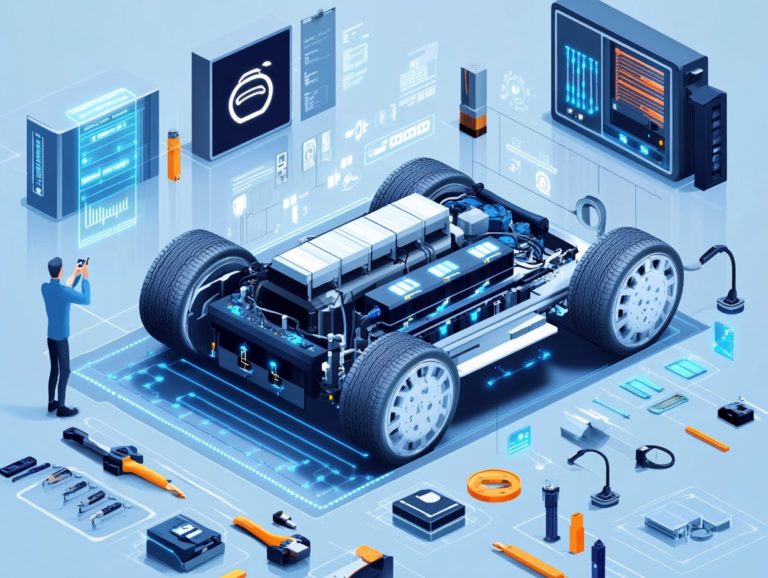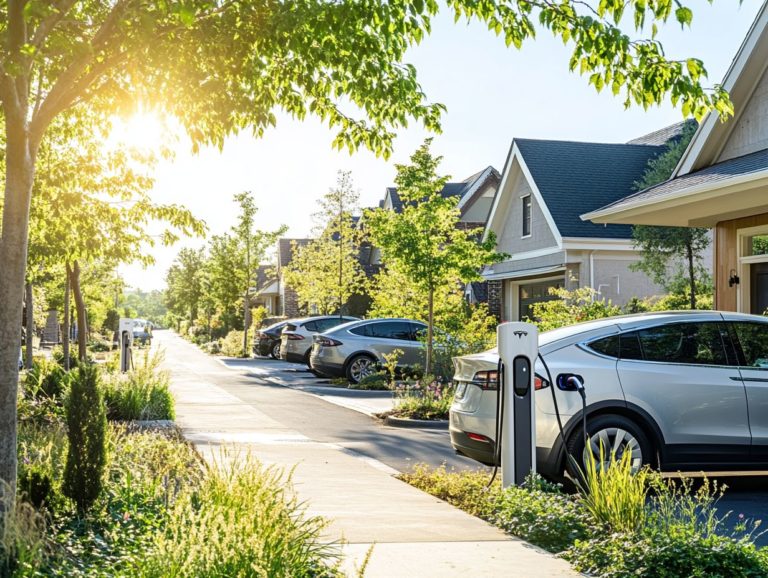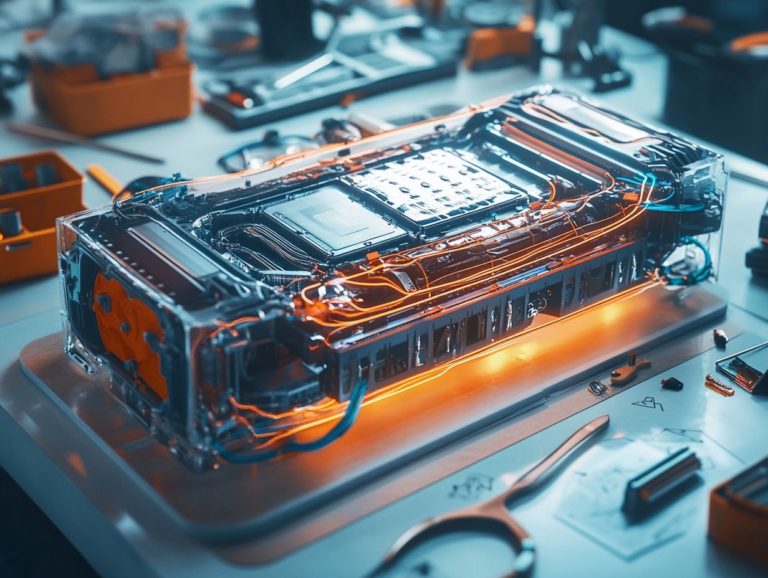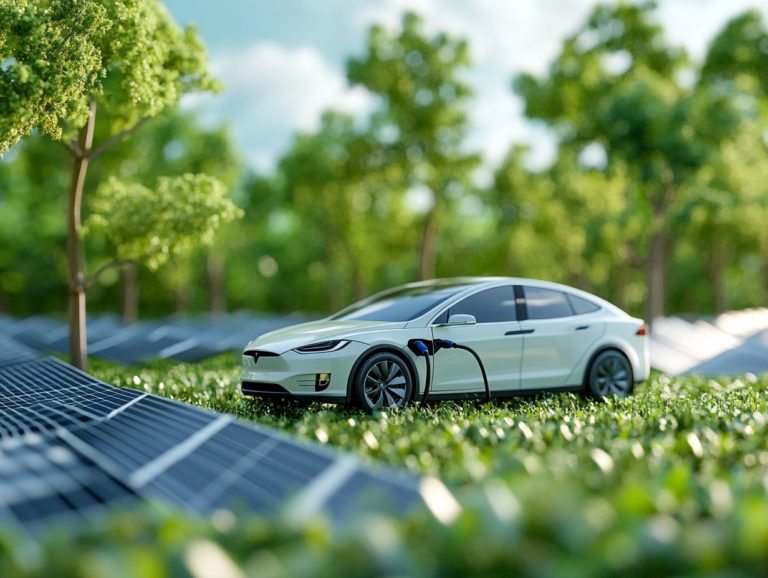How Often Should I Service My Electric Vehicle?
Keeping your electric vehicle (EV) in top shape is vital for its maintenance and performance.
Understanding how often to service your EV is essential for maximizing its longevity. Factors like your mileage, driving habits, and the specific model and age of your vehicle all play a role in determining your service frequency.
This guide offers recommended service schedules based on manufacturer guidelines and industry standards, outlines essential maintenance tasks, and evaluates the advantages and drawbacks of DIY servicing versus professional care.
Act now to keep your EV running at its best!
Contents
- Key Takeaways:
- Factors that Affect Service Frequency
- Recommended Service Schedule for Electric Vehicles
- Common Maintenance Tasks for Electric Vehicles
- DIY vs Professional Servicing
- Frequently Asked Questions
- How Often Should I Service My Electric Vehicle?
- What are the Benefits of Regularly Servicing My Electric Vehicle?
- What Does a Typical Electric Vehicle Service Include?
- Can I Service My Electric Vehicle Myself?
- Do I Need to Service My Electric Vehicle if I Don’t Drive Much?
- How Can I Find a Reliable Service Center for My Electric Vehicle?
Key Takeaways:

- Regular servicing is crucial for the proper maintenance of your electric vehicle and ensuring its longevity.
- Mileage, driving habits, and vehicle model and age are important factors to consider when determining service frequency.
- Following the manufacturer’s guidelines and industry standards is the best way to determine the recommended service schedule for your electric vehicle.
The Importance of Regular Servicing
Regular servicing of electric vehicles (EVs) is essential for optimal performance, longevity, and reliability. By adhering to a structured maintenance schedule, you can manage running costs, minimize repair bills, and enjoy a hassle-free driving experience.
Proactive upkeep extends beyond battery checks; it includes essential components like electric motors and energy-saving braking systems. Regular inspections help you catch potential wear and tear early on, preventing minor issues from escalating into costly repairs.
Monitoring your battery s health ensures efficient energy use, while maintaining the electric motor enhances torque essential for acceleration.
Also, the braking system that saves energy recovers energy during braking and needs attention to operate effectively, boosting your vehicle’s performance. Consistent care leads to increased driving range, improved handling, and a smoother ride, proving that routine servicing is not just beneficial but essential for preserving your electric transportation.
Factors that Affect Service Frequency
The frequency of servicing your electric vehicle depends on key factors like model, age, and your unique driving habits. To better understand these aspects, it’s helpful to explore the maintenance needs of EVs, as these elements significantly influence service intervals and overall maintenance needs.
For instance, how often you charge your vehicle and the driving conditions you encounter can dictate when maintenance checks are necessary, along with specific tasks like tire rotations and battery health assessments. Understanding these factors ensures optimal performance and helps reduce long-term running costs.
Mileage and Driving Habits
Mileage and driving habits significantly shape the maintenance schedule of your electric vehicle, affecting everything from service intervals to routine checks. For example, frequent short trips can put more strain on your battery pack and electric motor, requiring more regular maintenance compared to drivers who mostly take long highway journeys.
Incorporating specific practices into your routine can greatly enhance the reliability of your electric vehicle. Regular tire rotations improve grip and efficiency while extending the life of your tires, leading to reduced rolling resistance and improved range.
Check your brake fluid regularly to ensure it remains at optimal levels; a robust braking system is crucial for EVs. Monitoring vehicle data through apps or onboard systems provides insights into your driving patterns and battery health, helping you anticipate maintenance needs before they become urgent.
Cumulatively, these mindful practices significantly contribute to the overall longevity and performance of your electric vehicle.
Vehicle Model and Age
The model and age of an electric vehicle play a pivotal role in shaping your maintenance needs and costs. Newer electric models usually have features that reduce maintenance. Take electric vehicles like the Tesla Model and Jaguar I-Pace, for instance. They frequently offer extensive warranties and maintenance-free service packages that can significantly ease your ownership expenses.
On the other hand, older models might demand more frequent checks and potential aftermarket solutions to keep everything running smoothly.
This distinction becomes particularly evident when you examine leading brands like Volvo, renowned for its robust safety features and reliable performance, alongside Renault, celebrated for its practicality and cost-efficiency. Established manufacturers such as these tend to provide tailored maintenance schedules that adapt based on your vehicle’s age and model type.
The electric vehicle market is evolving, leading to fewer maintenance needs. Therefore, grasping these differences is essential for anyone looking to maximize reliability while minimizing long-term costs.
Recommended Service Schedule for Electric Vehicles
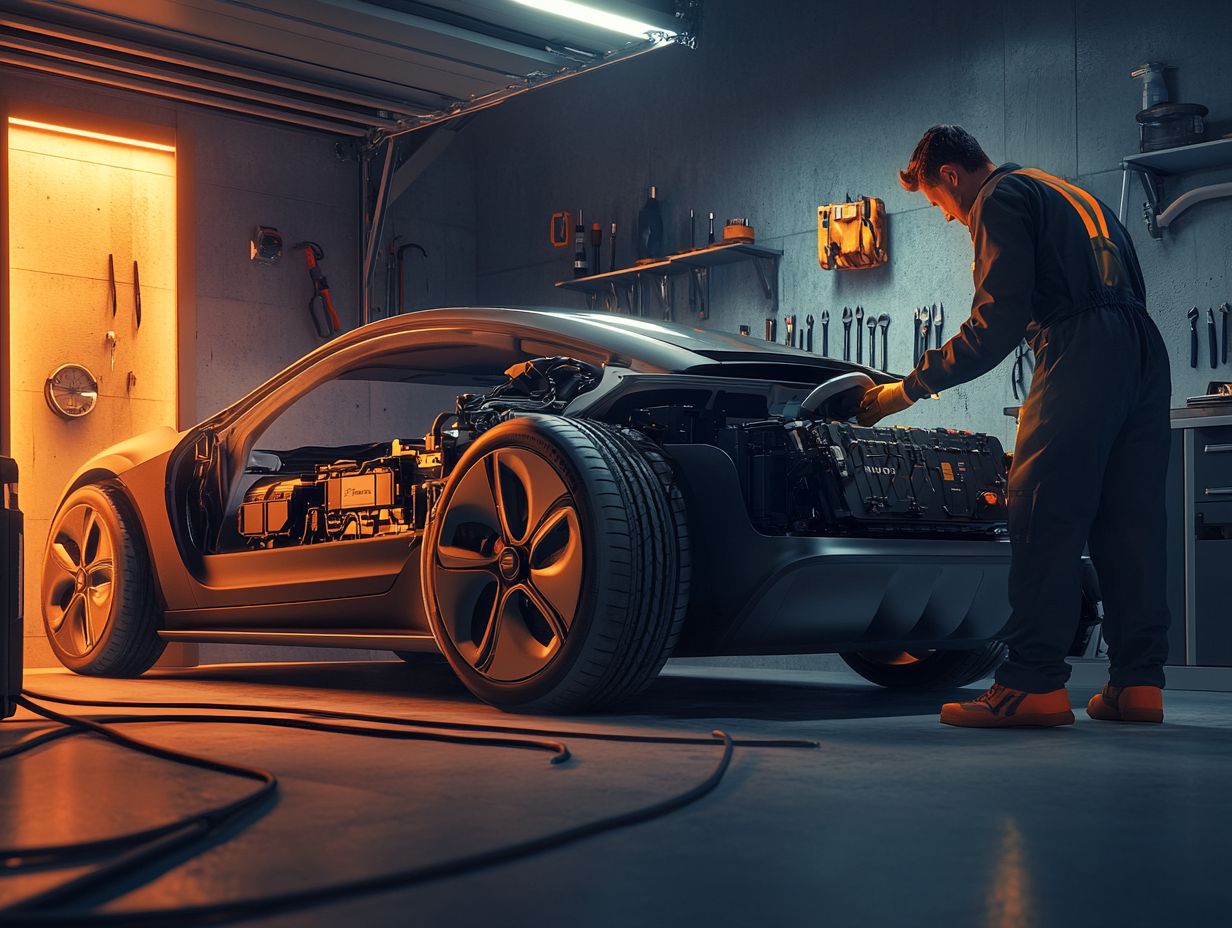
Establishing a recommended service schedule for electric vehicles is crucial for maintaining peak performance and extending their lifespan, all while adhering to manufacturer and industry standards.
These service guidelines typically list essential maintenance tasks, including battery health checks, oil level assessments, and tire rotations, allowing you to stay well-informed about your vehicle’s needs.
By following these recommendations, you can ensure that your electric vehicles, such as the electric Renault and Chevrolet Bolt, operate with optimal efficiency and effectiveness.
Manufacturer Guidelines
Manufacturer guidelines serve as an invaluable resource for you as an electric vehicle owner, offering vital insights into the recommended service requirements that guarantee optimal performance and longevity of your EV. These guidelines typically cover a range of aspects, including battery health checks, electric motor maintenance, and the necessity of routine inspections, empowering you to take a proactive approach to vehicle care.
Don’t wait for problems to arise; stay ahead with proper maintenance! By following these guidelines, you not only enhance the reliability of your EV but also cultivate a deeper understanding of its unique maintenance needs.
By adhering to these specifications, you can extend battery lifespan, improve charging efficiency, and prevent unexpected breakdowns. For example, many manufacturers suggest regularly checking tire pressure and tread depth to ensure maximum grip and range. Others emphasize the importance of periodic software updates that can fine-tune your vehicle s performance. Some brands even advocate for specific coolant and fluid checks to maintain heat management, which is crucial for both battery health and overall functionality.
This tailored approach helps you avoid issues, making your driving experience even better, ensuring that every journey you take is smooth and reliable.
Industry Standards
Industry standards significantly shape the maintenance practices for electric vehicles. They provide a solid framework that guides service maintenance and informs you about best practices. These standards cover everything from battery health to recommended service intervals. This helps you minimize operational costs and enhance the reliability of your vehicle.
By understanding these parameters, you can make informed decisions regarding your vehicle maintenance. You can also find aftermarket solutions that align with industry best practices.
These guidelines ensure that maintenance facilities follow uniform procedures in diagnosing and servicing electric vehicles. This ultimately leads to improved performance and safety. Consistent adherence to such regulations helps reduce unexpected breakdowns and prolongs the lifespan of essential components.
For you as an EV owner, this translates to better budgeting of your operational costs while enjoying greater peace of mind on the road.
Stay aware of the latest industry benchmarks to empower yourself to select qualified technicians and services. This enhances your overall ownership experience.
Common Maintenance Tasks for Electric Vehicles
Common maintenance tasks for electric vehicles are essential practices that you should prioritize to ensure your EV’s performance and longevity. These tasks include:
- battery health assessments
- tire rotations
- brake inspections
- monitoring fluid levels such as brake fluid and coolant
By staying vigilant with these responsibilities, you can enhance your vehicle’s reliability and significantly reduce the risk of costly repairs in the future.
Battery Health Check
Conducting regular battery health checks is essential for ensuring the optimal performance and longevity of your electric vehicle. The battery pack is one of the most critical components. These checks play a key role in identifying potential issues, validating warranties, and keeping you informed about the efficiency and health of your EV battery.
Stay proactive to minimize the risk of unexpected operational costs and enjoy a seamless driving experience.
Regular assessments typically involve evaluating your battery’s state of charge, capacity, and overall performance using specialized testing equipment. Key indicators to monitor include voltage irregularities, temperature variances, and the rate of self-discharge. These factors can significantly impact your vehicle’s efficiency.
Understand these metrics to take control of your maintenance decisions! Maintaining battery health not only extends its lifespan but also enhances your vehicle’s efficiency, contributing to environmental sustainability.
This approach ultimately helps reduce overall costs associated with more frequent replacements or repairs, making it a smart choice for any EV owner.
Tire Rotation and Alignment
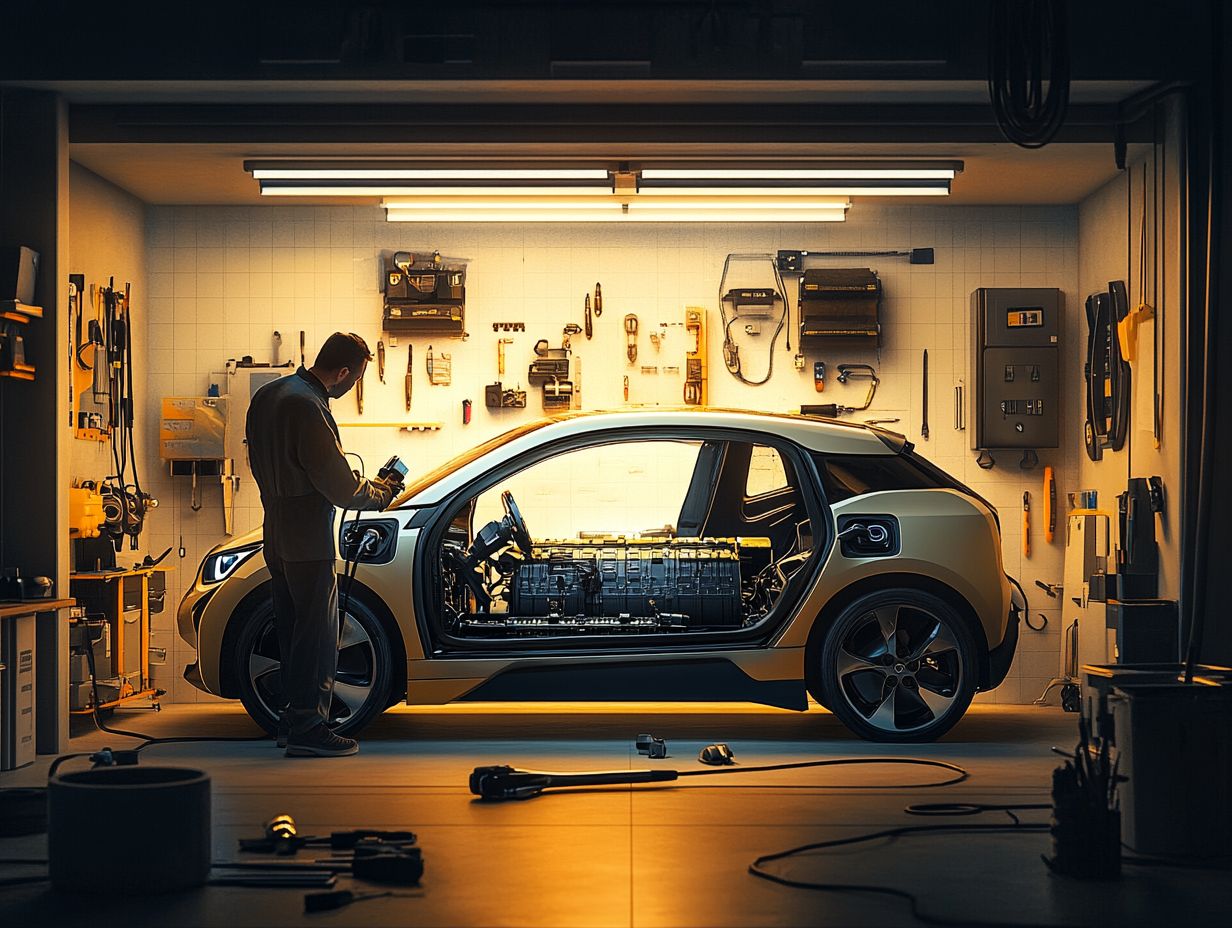
Tire rotation and alignment are crucial maintenance tasks for electric vehicles. They ensure optimal performance and safety on the road. By regularly rotating your tires, you help distribute wear evenly. Proper alignment enhances fuel efficiency and can significantly lower operational costs over time.
These practices are particularly vital for EV owners. Driving habits can heavily influence tire wear and overall performance.
Consider this: aggressive acceleration and sharp cornering can lead to uneven tire wear, making more frequent maintenance necessary. Experts recommend checking your tire alignment and rotation every 5,000 to 7,500 miles, although you might need to adjust this schedule based on your unique driving patterns.
By staying proactive with these maintenance tasks, you not only extend the lifespan of your tires but also improve handling, grip, and your overall driving experience. Consistent care contributes to your vehicle’s sustainability by maximizing efficiency and ensuring it performs smoothly. This protects the investment you’ve made in cutting-edge technology and mobility.
Brake Inspection and Replacement
Regular brake inspection and replacement are essential for maintaining the safe operation of your electric vehicle. Many models employ regenerative braking systems that can change traditional wear patterns. These inspections provide you with valuable insights on when to replace components, helping you maintain optimal performance.
By prioritizing brake maintenance checks, you can also sidestep potentially hefty repair bills that come with neglected brake systems. Unlike conventional vehicles, electric vehicles experience different braking patterns due to their regenerative systems, which may cause unexpected wear on brake pads and rotors.
It’s crucial for you to be attentive to indicators such as unusual noises, vibrations during braking, or a less responsive pedal. Experts suggest performing these inspections every 6,000 to 10,000 miles, or even more frequently depending on your driving conditions and patterns.
Staying proactive not only keeps your brakes effective but also enhances the overall safety, comfort, and longevity of your vehicle.
DIY vs Professional Servicing
When you consider maintaining your electric vehicle, the choice between DIY servicing and professional servicing can greatly influence your costs and reliability. Opting for DIY servicing may save you money, but it demands a solid grasp of the necessary maintenance checks and access to the right tools.
Choosing professional servicing gives you peace of mind, ensuring that every service requirement is fulfilled in line with manufacturer guidelines.
Pros and Cons of DIY vs Professional Servicing
Both DIY and professional servicing come with their distinct advantages and disadvantages that you should consider when mapping out your vehicle’s maintenance schedule. For instance, if you choose the DIY route, you might revel in lower costs and the gratifying experience of hands-on engagement with your electric vehicle.
However, be prepared to navigate challenges such as limited access to specialized tools and the constant need to keep pace with rapidly advancing technologies. On the flip side, opting for professional servicing provides you with the reassurance of skilled technicians who employ manufacturer-recommended tools and techniques, enhancing your vehicle’s reliability and longevity.
Of course, this expertise often comes with a premium price tag, which may not fit everyone’s budget. By weighing these options carefully, you can strategically plan your maintenance and optimize your electric vehicle s performance for the long haul.
Frequently Asked Questions
Got questions about your EV? We’ve got answers!
How Often Should I Service My Electric Vehicle?
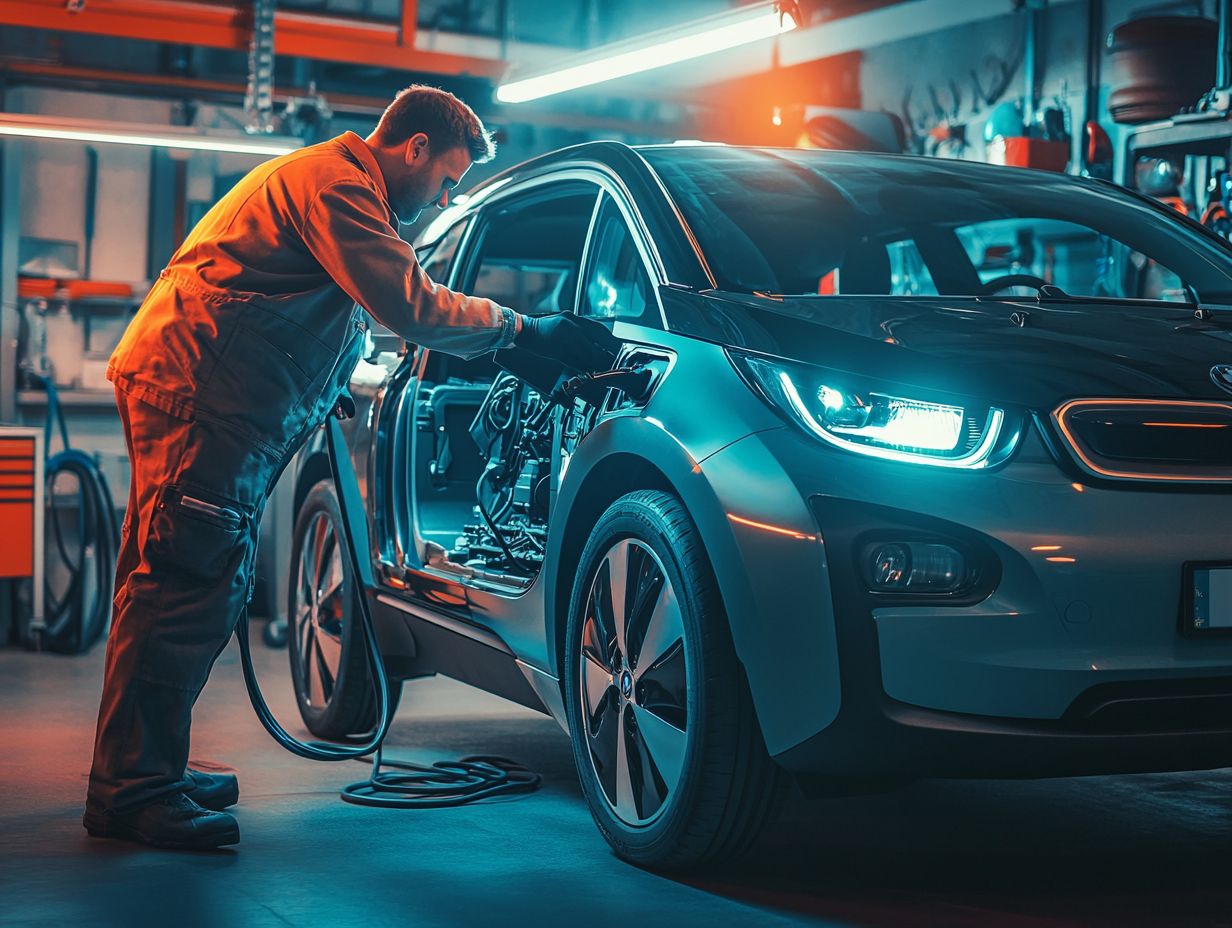
Service your EV every 10,000 15,000 miles or once a year.
What are the Benefits of Regularly Servicing My Electric Vehicle?
Regular servicing of your electric vehicle helps ensure optimal performance and efficiency. It also helps identify any potential issues early on, preventing costly repairs in the future.
Additionally, regular servicing can extend the lifespan of your electric vehicle.
What Does a Typical Electric Vehicle Service Include?
A typical electric vehicle service includes checking and topping off fluids like brake fluid and coolant, inspecting the battery and charging system, inspecting and rotating tires, and checking and replacing air filters.
It may also involve cleaning and lubricating various components, as well as running a check-up on the vehicle s systems.
Can I Service My Electric Vehicle Myself?
While some basic maintenance tasks can be done at home, it is not recommended to service your electric vehicle yourself. Electric vehicles have complex systems and require specialized equipment for servicing.
It is best to take your electric vehicle to a certified technician for servicing.
Do I Need to Service My Electric Vehicle if I Don’t Drive Much?
Even if you don t drive your electric vehicle often, regular servicing is vital! Certain parts, like the battery, can wear out over time, even if not in use.
Servicing helps prevent issues and keeps your electric vehicle healthy.
How Can I Find a Reliable Service Center for My Electric Vehicle?
Finding a certified service center for your electric vehicle is crucial. Check with the manufacturer or search online to locate certified centers nearby.
Choose a service center experienced in electric vehicle maintenance that uses high-quality parts.

